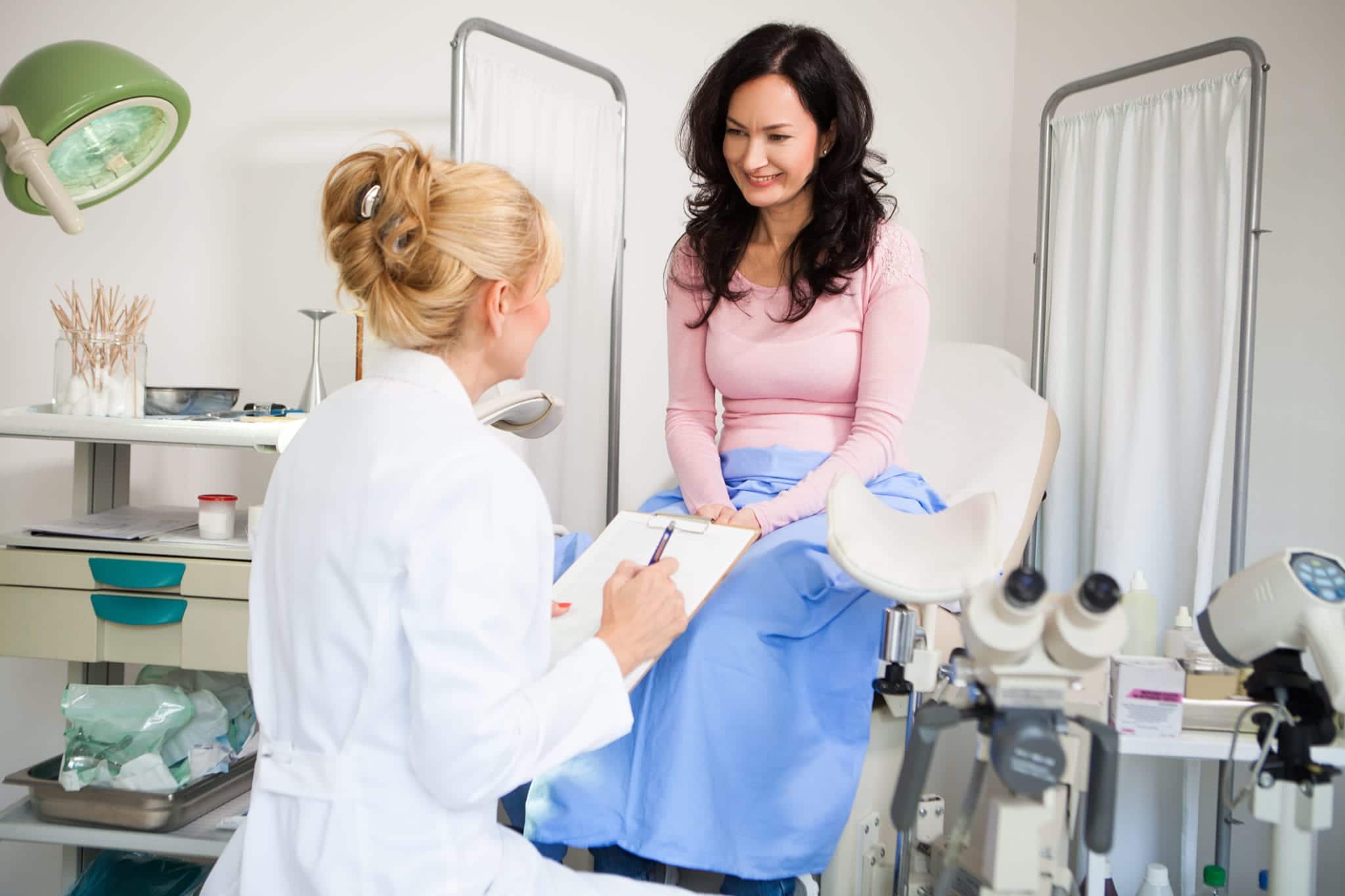Ovarian Cysts Specialist
Ovarian cysts can develop for different reasons, and while some can be benign, others can cause serious medical issues. At Northwest Women’s Center, women from throughout Houston, TX benefit from state-of-the-art diagnostic techniques and advanced ovarian cyst treatments to ensure they get the most appropriate care for their needs.

Ovarian Cysts Q & A
A cyst is a fluid-filled sac that’s typically benign. Ovarian cysts are sacs that form on the ovaries, and they can be divided into different types:
- Functional cysts occur as part of the normal menstrual cycle, and they’re very common. In fact, most women will have at least one functional cyst at some point in her lifetime, and in most cases, there will be no symptoms. These functional cysts form when something minor occurs that interferes with the normal release of the egg and typically resolve on their own within a few menstrual cycles.
- Endometriomas that form in women who have endometriosis, a painful condition that develops when the uterine lining tissue (the endometrium) grows outside the uterus. Endometriomas may cause few or no symptoms, but they can grow to be very large. In some cases, they can cause the ovary to become twisted, resulting in severe pain and requiring emergency treatment to prevent more serious complications.
- Dermoid cysts form during egg development and may contain irritants derived from egg cells.
- Cystadenomas are cysts that contain a mucousy liquid.
Small, asymptomatic cysts typically require no treatment, but their growth may be monitored. Many cysts cause no symptoms, but when symptoms do occur, they can include:
- abdominal pain or cramping or pelvic pain or pressure
- painful periods, as well as pain just before a period
- pain during intercourse
- painful bowel movements
- abdominal pain or cramping or pelvic pain or pressure
- painful periods, as well as pain just before a period
- pain during intercourse
- painful bowel movements
There is no way to prevent ovarian cysts because there are numerous factors that may cause them to form. Doctors encourage women to pay close attention to their monthly cycles and to notate unusual symptoms. Women should also receive regular pelvic exams from their gynecologists to help track changes in the ovaries.
Yes. Bloating is a common symptom of an ovarian cyst. This sensation isn’t true bloating but the abdominal expansion caused by the size of the cyst.

Asymptomatic cysts including functional cysts typically do not require treatment, but their growth may be monitored. Some symptomatic cysts may be treated with hormone medicines including birth control pills or with surgery to remove the cyst. In very severe cases such as when the ovary has become twisted, the entire ovary may need to be removed.
Treatment for Ovarian Cysts
How is a Laparoscopy performed?
Laparoscopic surgery is performed using general anesthesia, which puts you into a sleep state. General anesthesia also blocks pain. To begin the procedure, the doctor makes an incision just beneath the navel. They insert the laparoscope, a thin tube with a camera on the end, through the incision. Carbon dioxide gas is inserted into the abdominal cavity to allow the doctor a better view of internal organs. The laparoscope is then progressed to the ovary to locate the cyst. Once the cyst is found, the doctor makes another 1 or 2 incisions. Surgical instruments are inserted through these incisions to remove the cyst. The incisions are closed with staples or stitches. The procedure takes 1 to 2 hours.
What is the recovery like after a Laparoscopy?
Most laparoscopic procedures are performed on an outpatient basis. However, in some cases, a patient may stay overnight in the hospital. Soreness is common during the first 1 to 2 days following surgery. Patients are encouraged to walk based on their energy level, taking care not to over-do it. Comfort and energy level should improve significantly within a week of their laparoscopic surgery. Still, they should avoid pushing, pulling, and lifting heavy objects for a few weeks. Sexual intercourse may resume once cleared by the doctor. Full recovery occurs in 4 to 6 weeks.
What are the risks of a Laparoscopy?
Laparoscopic surgery is minimally-invasive, though there are a few risks. These include bladder infection, skin infection, and skin irritation.
More serious complications are possible but are rare. They include:
- Damage to a reproductive structure such as the uterus, to the bladder or bowel, or to an abdominal blood vessel.
- Problems with urination.
- Allergic reactions.
- Nerve damage.
- Blood clots.
- Adhesions.
When is surgery necessary to remove an Ovarian Cyst?
An ovarian cyst may need to be removed if it is causing pain, is solid, or if is larger than 2.5 inches in diameter. Any cyst that is suspected of cancer should be removed.
What happens if I leave an Ovarian Cyst untreated?
If an ovarian cyst could be cancerous, it must be removed. Benign ovarian cysts, however, may be monitored. In the past, doctors were more likely to remove benign cysts due to concerns that they may cause serious complications such as rupture. There were also concerns that a cyst may be misdiagnosed as benign. To err on the side of safety, doctors often recommended removal. This approach is less common today. Because surgery has risks of its own, and we now have more advanced technologies to monitor changes in cysts, a doctor may take a watchful waiting stance. This approach includes regular ultrasound scans or other imaging to measure cyst size and appearance. Studies, including one of more than 1,900 cases, indicate that it should be safe to simply monitor non-cancerous ovarian cysts.
We must note that every situation is unique. If you have an asymptomatic but benign ovarian cyst, you may wish to have it removed.
Hear From Our Patients
"I absolutely love the Northwest Women's Center. Every experience has been great and they have always taken amazing care of me and address all of my issues, if any. I see Dr. Judy Greer and I adore her. I would not want to see anyone else."
Schedule Your Appointment Today
For more information on ovarian cysts or to schedule your appointment today, call Northwest Women's Center at 281.444.3440.